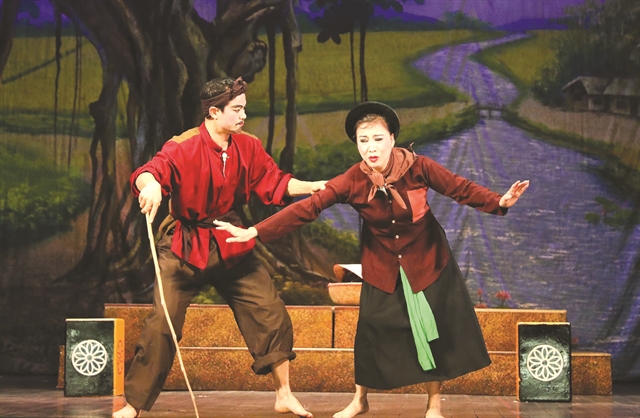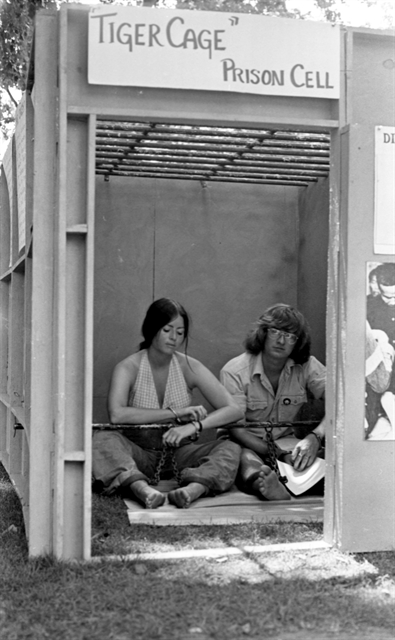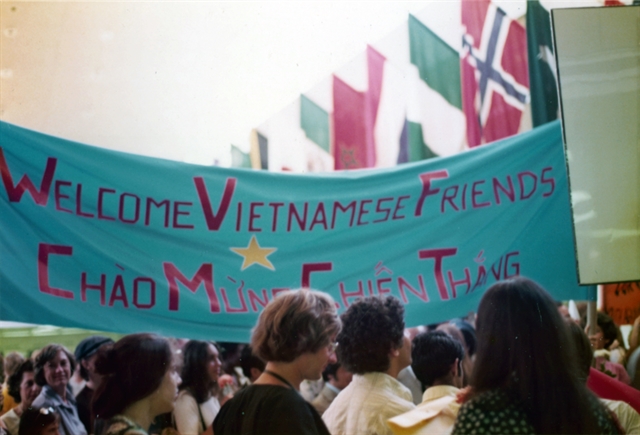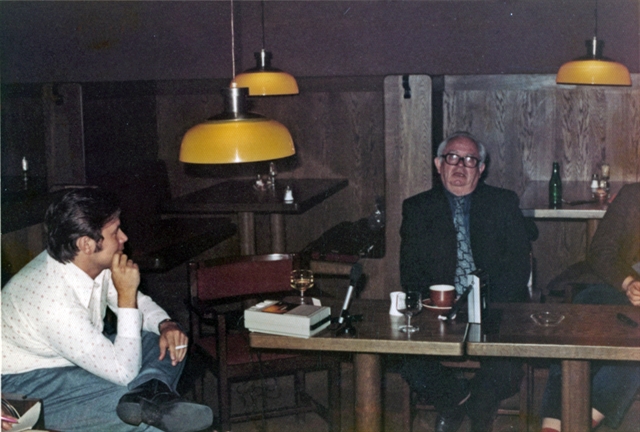 Features
Features

Việt Nam's long history of gaining independence and the true nature of the US war in Việt Nam were exposed by Robert Chenoweth, a Việt Nam war veteran and anti-war POW, who raised his voice against the war by writing letters and making radio broadcasts, trying to explain the war to people at home and GIs still fighting.

|
| Fight for justice: Robert Chenoweth (right) and activist Cheryl Parker inside a mock tiger cage outside the US Capitol, part of the Campaign to Cut Aid to the Saigon regime in 1973. Photo courtesy of Robert Chenoweth |
Việt Nam's long history of gaining independence and the true nature of the US war in Việt Nam were exposed by Robert Chenoweth, a Việt Nam war veteran and anti-war POW, who raised his voice against the war by writing letters and making radio broadcasts, trying to explain the war to people at home and GIs still fighting.
I was released on March 15th, 1973 from Hỏa Lò Camp. We rode in camouflaged buses to Gia Lâm airport. I travelled with the other members of the “Peace Committee”, and after going through the release ceremony we boarded our transport plane and flew from Hà Nội to Clark Air Base in the Philippines. After several days of medical exams, and new clothes we headed home. I flew to Hawaii and then to Travis AFB near San Francisco.
For the next several months I was assigned to Letterman Army Medical Center at the Presidio of San Francisco. I met my family after arriving at Letterman and for the first time I was able to talk to them about my capture and my experiences in Việt Nam. After a few weeks I was able to go home on medical leave. Within days of coming home I was meeting with television and newspaper reporters. I had already been identified as being part of the “Peace Committee”, so that was what the reporters wanted to ask about.
During that time, I traveled to Los Angeles to visit Al Riate. Al also came to Portland to visit me with his new wife. We travelled to the Warm Springs Indian Reservation where we rode horses and fished. My father came up and we all fished together and enjoyed being home. About the 29th or 30th of May, while on a trip with my father and stepmother I picked up a newspaper based on the headline, 'Former POWs charged by Air Force officer'. I received a message saying to call my Military Lawyer at the Presidio. My father and I were on a plane and in San Francisco the next day. We met with my lawyer who explained the charges. An Air Force colonel named Guy charged all the peace committee members with various acts apparently based on things some other POWs said we did. We met Guy only once in captivity the day before we were released when our release group was gathered together. He told us we should all zip our grey jackets to the same height so they would look like uniforms (like a military unit). My lawyer said the charges amounted to “hearsay” and that most would be dismissed out of hand. My dad told the Army people present that if the Army tried to send me to prison for my anti-war activities he would drive me to Canada himself. I was so proud of my dad that day. My POW time was very painful for him, not knowing until Christmas 1971 that I was indeed a prisoner. He was a World War Two veteran who had served in the submarine forces in the Pacific. He knew the war was wrong and reminded me many times before I went to Việt Nam in 1967 that we were being lied to and that corporate and right wing interests were driving our war there. Big companies that made military equipment were getting rich at the expense of American youth. He did believe we were fighting to save the Vietnamese from Communism. I did not understand the knowledge he had gained growing up in depression-era America.

|
| Warm welcome: A picture taken in NYC shows part of a group that welcomed the 1st Vietnamese Ambassador to the UN, 1978. Photo courtesy of Robert Chenoweth |
In early June Larry Kavanaugh came with Sandy his wife and Cindy, the daughter he had never seen. They came during the Rose Festival in Portland. We enjoyed the big parade and I took them to see various sites around my home town. They returned home after the festival on about the 12th or 13th. On June 27th Larry took his own life at home. It was a very sad day.
I attended Larry’s funeral with fellow POWs on July 2nd. That evening I got a call at my hotel, that I should come to the Presidio. My father and I got on a plane the next day and reported to Letterman Army Hospital at the Presidio of San Francisco. I was told the charges were dropped and that I would not be able to remain in the Army. It was too late in the day to be discharged and the next day was July 4th, Independence Day. My father and I were taken over to Oakland Army Terminal and within an hour I was out of the Army. Later that month I received a letter from the IndoChina Peace Campaign inviting me to visit with Tom Hayden and Jane Fonda. They told they were beginning a second National Tour to explain the Peace Agreements and to make sure the government ended its support for the Thiệu regime in Saigon. A French teacher named Jean Pierre DeBris who was arrested and imprisoned in the infamous Chí Hòa prison was also going on the tour. DeBris was arrested with Andre Menrais.
Along with singer Holly Near we traveled to about 36 cities in over three months, beginning in September. The tour gave me a chance to meet many people from the anti-war movement. Among the people I met and got to know were Cora Weiss, Don Luce, Garth Porter, Fred Branfman, Tom Hayden, many members of Việt Nam Veterans Against the War and countless other activists. Each had a story to tell me about their own experience, all of which moved me very much. I had read their names in stories about the anti-war movement and seen some of them on film. I spoke to thousands of Americans about my experiences and was warmly welcomed.

|
| Talks: Wilfred Burchett, a well-known anti-war journalist at the Stockholm Conference on Việt Nam during the US war. The man in white (left) is a member of the US delegation. Photo courtesy of Robert Chenoweth |
Following the tour, I continued sharing my experiences with other organisations and continued traveling around the country to talk. I travelled with the IndoChina Mobile Education Project out of Washington DC, showing the film “Year of the Tiger” with film maker David Davis.
In 1976, I married and moved to Washington DC working at the Institute for Policy Studies and studying at American University for a degree in anthropology. I also worked at the reconstruction laboratory of the Smithsonian’s National Museum of Natural History. I began learning about the museum world.
After finishing my degree I went to work at the National Air and Space Museum as a Museum Technician. I continued to be active with speaking and supporting other groups. I travelled to Montreal with other Americans to support South African war resisters and deserters who refused to fight in Namibia and we hosted many activists and leaders from other countries.
Though out my daily life I have had the chance to talk to people because of my POW experience, but mostly my experience in Việt Nam shaped my thinking to the point that I am able to help other people see the world more clearly and to understand the relationships that shape our world.
Even today when I talk to people about Ancient Archery in China, Việt Nam, and Mongolia I explain to people the history and how colonialism attacked these ancient cultures and the impact on the present day. The bow and arrow is a way to talk to people. VNS




